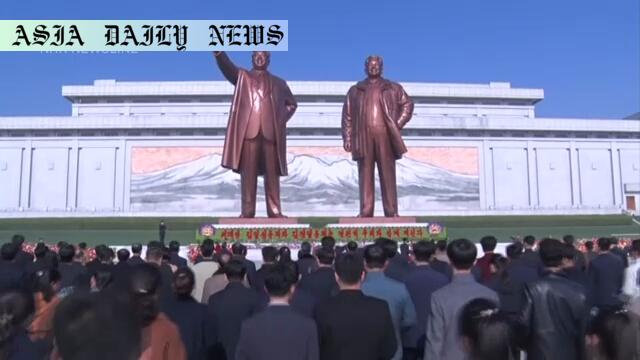North Korea celebrates the 113th birthday of Kim Il Sung, showcasing loyalty to Kim Jong Un amid shifting geopolitical ties.
- North Korea celebrates Kim Il Sung’s 113th birthday as a major public holiday, emphasizing his achievements.
- Celebrations include evening events in Pyongyang and loyalty calls for Kim Jong Un by state-run media.
- North Korea is experiencing rapidly deepening military cooperation with Russia amid unstable ties with China.

Introduction: The Legacy of Kim Il Sung
North Korea commemorated the 113th birthday of Kim Il Sung, the founding father and revered leader of the country, marking his enduring presence in the hearts of its people. As the grandfather of the current leader, Kim Jong Un, his legacy not only shapes the ideological framework of the North Korean government but also reinforces the emotional and political ties that bind the nation. April 15, known as the ‘Day of the Sun,’ is celebrated as North Korea’s most significant public holiday, symbolizing unity and loyalty to the ruling regime.
Celebrations in Pyongyang: Honoring the Past
The capital city of Pyongyang becomes the epicenter of nationwide festivities. According to state-run media, elaborate events in the evening bring together civilians and political elites to pay tribute to Kim Il Sung. Tuesday’s edition of the Workers’ Party newspaper, Rodong Sinmun, carried an editorial lauding Kim’s monumental achievements and urging citizens to renew their commitment to his grandson, Kim Jong Un. Moreover, state-controlled coverage revealed citizens attending a facility housing Kim Il Sung’s portrait, reflecting the reverence and near-mythical status he continues to hold in the country’s collective memory.
Shifting Geopolitical Landscape
While the celebration reflects internal solidarity, North Korea’s international relationships reveal a more complex story. The country’s growing ties with Russia, evident through its reported troop contributions amidst Russia’s ongoing conflict in Ukraine, demonstrate a marked pivot. Observers have noted how these developments have strained North Korea’s historically close relationship with China, leading to possible economic repercussions. This dynamic underscores a broader recalibration of alliances at a time when geopolitical tensions are high and nationalistic fervor is leveraged to fortify domestic unity.
The Interplay of Culture and Politics
North Korea’s dual emphasis on cultural traditions and political messaging reflects its unique governance approach. By intertwining Kim Il Sung’s memory with the current leadership’s vision, cultural expressions like national holidays become instruments of statecraft. Through these celebrations, the government reinforces its legitimacy, urging the populace to reaffirm their trust in Kim Jong Un’s stewardship amidst international isolation and challenges. Such deeply ingrained practices reveal the complexities of a nation where political loyalty is both a cultural expectation and an enforced directive.



Commentary
The Importance of Historical Legacy
North Korea’s observance of Kim Il Sung’s birthday as its most significant holiday underscores the profound impact leadership legacies have on national identity. Nations worldwide celebrate their historical figures, but in North Korea, this takes on a near-spiritual aspect. The emphasis on loyalty to Kim Jong Un is not incidental. It speaks volumes of how leadership longevity and heritage are preserved as essential pillars of statehood. For outsiders, it poses a fascinating case study in how history, narrative control, and governance converge.
Geopolitical Shadows over Celebrations
As Pyongyang prepares for grand evening celebrations, it does so against the backdrop of shifting alliances. The strengthening partnership with Russia and the strained ties with China place North Korea in an uncertain zone. Economically reliant yet politically defiant, North Korea’s precarious tightrope walk could determine whether such displays of unity signal resilience or mask vulnerability. As foreign observers analyze these relations, the lessons from North Korea’s tightrope diplomacy are numerous and thought-provoking.
The Cultural Aspect of Loyalty
From a sociological perspective, the portrayal of Kim Il Sung as a foundational figure cements the idea of familial loyalty extending beyond personal ties into governance. This familial element is used strategically to evoke emotional allegiance while connecting generations through a shared past. Such mechanisms highlight an interplay between tradition and authoritarianism. While the international community may criticize such practices, it is essential to understand their underlying cultural significance before dismissing them outright. The contrasting views open the door for deeper introspection about global perceptions of governance.